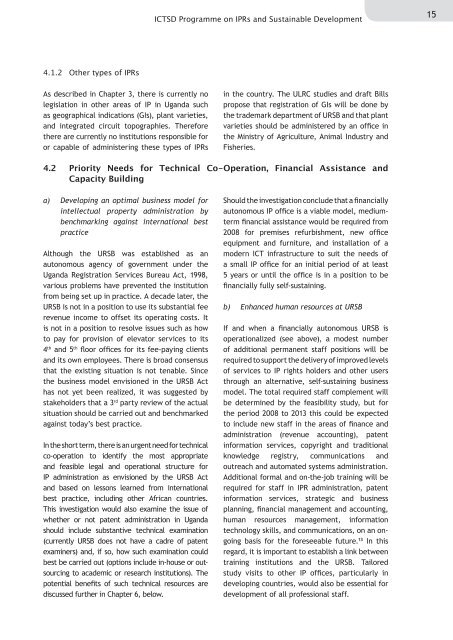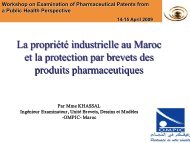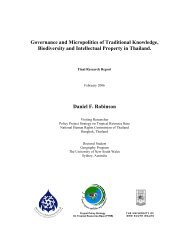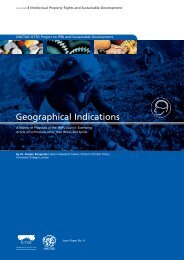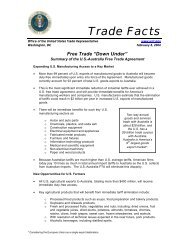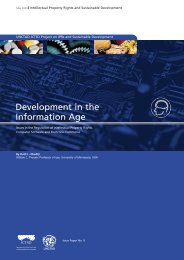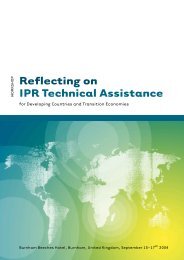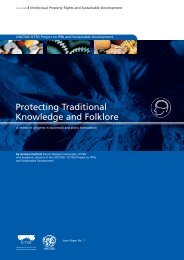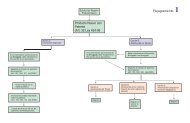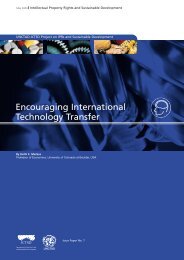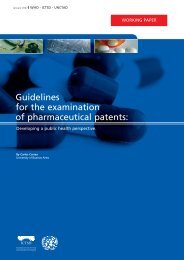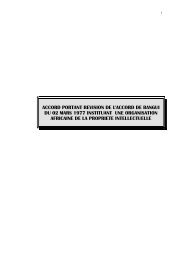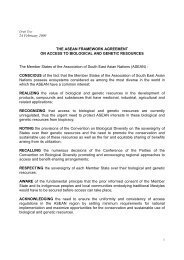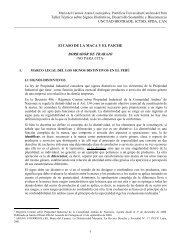Final Report of Uganda Intellectual Property ... - IPRsonline.org
Final Report of Uganda Intellectual Property ... - IPRsonline.org
Final Report of Uganda Intellectual Property ... - IPRsonline.org
Create successful ePaper yourself
Turn your PDF publications into a flip-book with our unique Google optimized e-Paper software.
ICTSD Programme on IPRs and Sustainable Development<br />
15<br />
4.1.2 Other types <strong>of</strong> IPRs<br />
As described in Chapter 3, there is currently no<br />
legislation in other areas <strong>of</strong> IP in <strong>Uganda</strong> such<br />
as geographical indications (GIs), plant varieties,<br />
and integrated circuit topographies. Therefore<br />
there are currently no institutions responsible for<br />
or capable <strong>of</strong> administering these types <strong>of</strong> IPRs<br />
in the country. The ULRC studies and draft Bills<br />
propose that registration <strong>of</strong> GIs will be done by<br />
the trademark department <strong>of</strong> URSB and that plant<br />
varieties should be administered by an <strong>of</strong>fice in<br />
the Ministry <strong>of</strong> Agriculture, Animal Industry and<br />
Fisheries.<br />
4.2 Priority Needs for Technical Co-Operation, Financial Assistance and<br />
Capacity Building<br />
a) Developing an optimal business model for<br />
intellectual property administration by<br />
benchmarking against international best<br />
practice<br />
Although the URSB was established as an<br />
autonomous agency <strong>of</strong> government under the<br />
<strong>Uganda</strong> Registration Services Bureau Act, 1998,<br />
various problems have prevented the institution<br />
from being set up in practice. A decade later, the<br />
URSB is not in a position to use its substantial fee<br />
revenue income to <strong>of</strong>fset its operating costs. It<br />
is not in a position to resolve issues such as how<br />
to pay for provision <strong>of</strong> elevator services to its<br />
4 th and 5 th floor <strong>of</strong>fices for its fee-paying clients<br />
and its own employees. There is broad consensus<br />
that the existing situation is not tenable. Since<br />
the business model envisioned in the URSB Act<br />
has not yet been realized, it was suggested by<br />
stakeholders that a 3 rd party review <strong>of</strong> the actual<br />
situation should be carried out and benchmarked<br />
against today’s best practice.<br />
In the short term, there is an urgent need for technical<br />
co-operation to identify the most appropriate<br />
and feasible legal and operational structure for<br />
IP administration as envisioned by the URSB Act<br />
and based on lessons learned from international<br />
best practice, including other African countries.<br />
This investigation would also examine the issue <strong>of</strong><br />
whether or not patent administration in <strong>Uganda</strong><br />
should include substantive technical examination<br />
(currently URSB does not have a cadre <strong>of</strong> patent<br />
examiners) and, if so, how such examination could<br />
best be carried out (options include in-house or outsourcing<br />
to academic or research institutions). The<br />
potential benefits <strong>of</strong> such technical resources are<br />
discussed further in Chapter 6, below.<br />
Should the investigation conclude that a financially<br />
autonomous IP <strong>of</strong>fice is a viable model, mediumterm<br />
financial assistance would be required from<br />
2008 for premises refurbishment, new <strong>of</strong>fice<br />
equipment and furniture, and installation <strong>of</strong> a<br />
modern ICT infrastructure to suit the needs <strong>of</strong><br />
a small IP <strong>of</strong>fice for an initial period <strong>of</strong> at least<br />
5 years or until the <strong>of</strong>fice is in a position to be<br />
financially fully self-sustaining.<br />
b) Enhanced human resources at URSB<br />
If and when a financially autonomous URSB is<br />
operationalized (see above), a modest number<br />
<strong>of</strong> additional permanent staff positions will be<br />
required to support the delivery <strong>of</strong> improved levels<br />
<strong>of</strong> services to IP rights holders and other users<br />
through an alternative, self-sustaining business<br />
model. The total required staff complement will<br />
be determined by the feasibility study, but for<br />
the period 2008 to 2013 this could be expected<br />
to include new staff in the areas <strong>of</strong> finance and<br />
administration (revenue accounting), patent<br />
information services, copyright and traditional<br />
knowledge registry, communications and<br />
outreach and automated systems administration.<br />
Additional formal and on-the-job training will be<br />
required for staff in IPR administration, patent<br />
information services, strategic and business<br />
planning, financial management and accounting,<br />
human resources management, information<br />
technology skills, and communications, on an ongoing<br />
basis for the foreseeable future. 13 In this<br />
regard, it is important to establish a link between<br />
training institutions and the URSB. Tailored<br />
study visits to other IP <strong>of</strong>fices, particularly in<br />
developing countries, would also be essential for<br />
development <strong>of</strong> all pr<strong>of</strong>essional staff.


